The problem with manual accounting systems is that most small firms struggle to understand when they are no longer fit for purpose.
They might have sufficed in the early stage when the firm was too small, clients were few, and finances were too low to afford a dedicated, cloud-based accounting software.
It doesn’t help that when they consider switching to a software solution, they find that every tool is promising to provide the value they’re looking for: remote collaboration, task automation, and seamless integration with other tools (such as tax, payroll, and client management systems).
This article compares the features and functionalities that the top small firm accounting software should have to address their current and growing needs.
Why Choosing the Right Accounting Software Matters for Small Firms
A six-person accounting firm that serves small businesses in the U.S. realized they needed to move their disjointed manual accounting systems to the cloud and opted for an all-in-one accounting software that included project and client management features.
Their first unpleasant surprise, a few weeks into the software, was that the accounting features were too basic and didn’t include bank feeds integration. The team had to manually import necessary data every week, which led to unnecessary errors and struggles to keep financial records up-to-date.
By the time tax season came around, the system was overwhelmed and malfunctioned to the extent that staff had to add backup spreadsheets just to get through the season in one piece. Team members ended each day feeling more exhausted than the last.
This resulted in more errors, and two major clients left shortly afterwards (partly because they couldn’t access their real-time financial data).
The experience left the team wishing they had gotten a dedicated accounting software instead. The time, money, and effort they end up spending to switch to another solution and repairing client relationships would have been used to improve client service and drive growth.
Challenges small firms face with outdated or manual accounting systems
Failure to switch to an accounting software solution creates several problems for accounting firms and their clients:
- Inefficiency and Errors: Manual systems rely mostly on human input, and humans are prone to errors on a good day. It gets worse when they are under pressure to meet compliance deadlines. Your team members can easily mix up figures that will result in inaccurate financial statements and wrong business decisions.
- Limited Collaboration: Spreadsheets and other manual accounting systems stifle collaboration because, for example, it is difficult for team members to work on the same financial data when they are not in the same physical location.
- Poor Client Experience: Manual accounting tools do not allow clients to access their data and documents on their own, making it harder to provide real-time updates.
The shift toward cloud-based solutions in 2025
Frustrated by these challenges, small firms are quickly moving their practices to the cloud to benefit from features that enable sustainable growth and scalability, such as:
- Remote Access: web-based accounting software is accessible to team members from anywhere and at any time, enabling them to work from anywhere and at any time.
- Automation of Routine Tasks: From bank feeds to invoice tracking and AI-driven reconciliation, accounting software is built with automation that reduces manual work and enables accounting teams to free up capacity for analysis and problem-solving.
- Real-Time Collaboration: Hosted in the cloud, accounting software allows multiple team members to discuss, share data, and work together to improve the quality of service delivered to clients.
Key Features to Look for in Small Firm Accounting Software
Ease of use and onboarding
A clean and user-friendly interface makes it easy for small firms to implement and navigate an accounting software solution daily.
This is important because small accounting firms neither have the time nor the resources to go through long training circles or call customer support several times a week.
Most accounting software solutions have
- Guided Setup: Checklists, walkthrough videos, and sometimes expert guidance for setting the tool up for tasks like data import and bank feed.
- Learning Resources: Articles, infographics, and short videos that show how to perform specific tasks in the software.
Integration with tax and payroll tools
The easier you can integrate your accounting software with the other tools in your tech stack, the faster your workflows will be. Your team will be happier, and client service will be more accurate.
For example, integration with your tax software means that your client’s financial data can be exported directly into your tax software, which preserves the integrity of the data.
Automation and AI capabilities
Automation and AI will set up your accounting tasks to operate without human intervention. This frees up your team’s capacity for tasks that need their undivided attention.
Examples of these in action include auto-generated reports, AI-driven cash flow forecasting, and OCR-enabled receipt scanning.
Automation and AI in an accounting software solution also reduce errors and improve the chances of client satisfaction.
Security and data privacy
Technology will not only give your team members access to financial information. Unauthorized persons can also access them when the right precautionary measures are not in place.
That is why security and data privacy are one of the deal-breaker features of accounting software. After all, it doesn’t matter whether your team becomes more efficient or productive if sensitive client data is compromised.
Some of the security features to look out for include data encryption, multi-factor authentication, role-based access control, and compliance with security standards, like ISO, SOC 2, and GDPR.
Scalability and support
All things being equal, this stage is the smallest your firm will ever be, so it wouldn’t be smart to get an accounting software that is only suitable for your current stage.
If adding more clients and team members will overwhelm the tool, then you’ll be just the right size away from needing to migrate to another tool, which will be a waste of your time and resources.
Find out about the size of accounting teams your prospective tool supports and see if some of them align with the size of the firm you’re hoping to build.
Another way to understand this is by looking at its features to see if it has multi-user support, multicurrency support, accountant collaboration, multi-location support, and feature upgrades
Similarly, technical issues can come up as you use a software solution. Reliable customer support will ensure that your challenges are resolved as quickly to save time.
Top Cloud Accounting Tools for Small Firms in 2025
1. QuickBooks Online
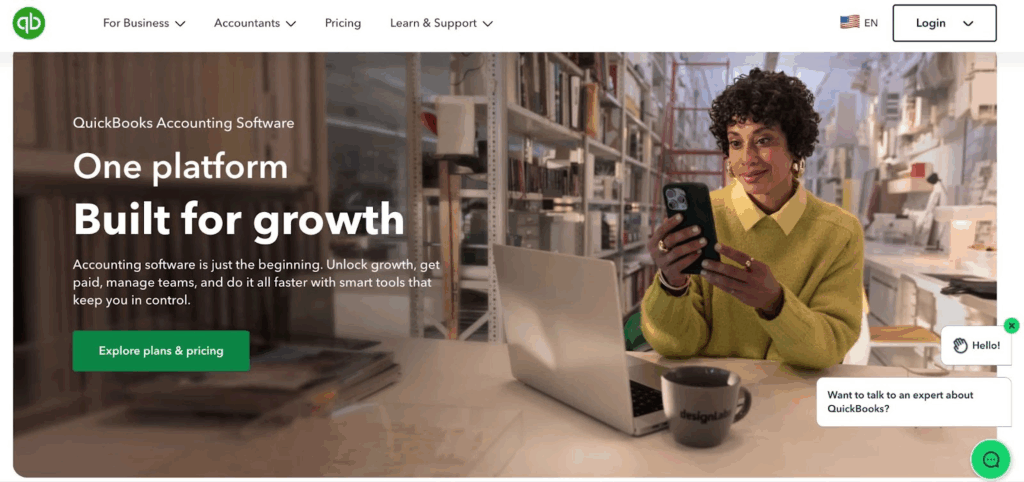
QuickBooks Online is an accounting software with comprehensive features that enable firms to record financial information and generate reports that inform business decisions.
It is the most popular accounting software on the market, with up to 81% of the total market share, which enables it to integrate with numerous accounting workflow-related software solutions.
Here are some of QBO’s features and their benefits
- Automated Bank Feeds: Saves time by connecting directly to bank accounts to import and reconcile transactions.
- Prep for Taxes: Gathers and stores clients’ reports, information, and financial statements to simplify year-end accounting tasks.
- Integrated Payroll and Tax Tools: Automated payroll runs and integrations with tax preparation platforms for automated tax calculations and form filing.
- Customizable Reporting: Detailed financial and management reports that help firms deliver more value to their clients.
- App Marketplace: Integrates with 700+ of accounting workflow-related apps (like time tracking, inventory, and payments).
- Multi-User Collaboration: Enables multiple team members to access information and collaborate remotely.
- Role-based Permissions: Enable firm owners to regulate the information that team members can access.
2. Xero
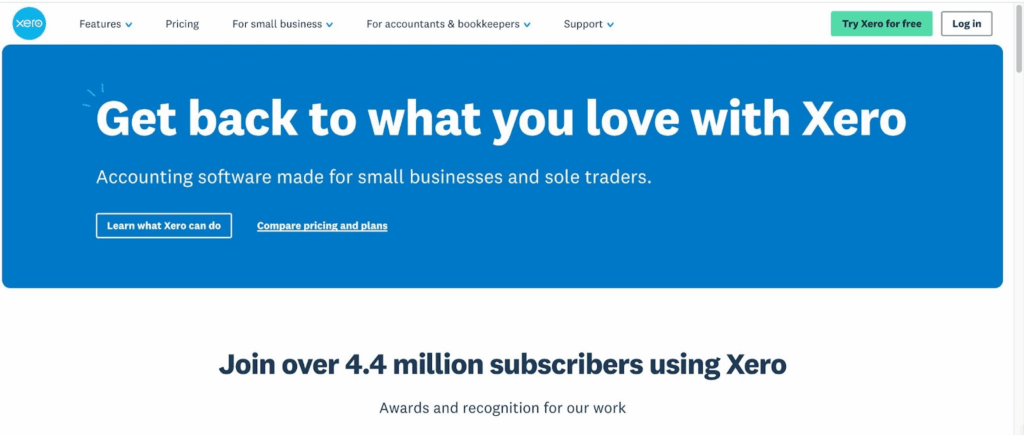
Xero is a simple cloud-based software that enables accounting teams to access financial data and collaborate across teams.
It processes transactions, updates records, and generates reports instantly to help accounting firms maintain complete and accurate financial data for clients.
Here are some of Xero’s features and their benefits:
- Automated Bank Feeds: Pulls in transactions from banks to save time on data entry.
- Project Tracking: Manages billable hours, projects, and client costs.
- Smart Reconciliation: AI-powered bank reconciliation that speeds up workflows by suggesting matches for transactions.
- Role-based Permissions: Limit data access to relevant team members.
- Extensive Integrations: Connects with 1000+ accounting workflow-related apps, including CRM, payments, and reporting tools.
- Reports: Advanced reports that paint an accurate financial picture, enabling timely decision-making.
3. FreshBooks
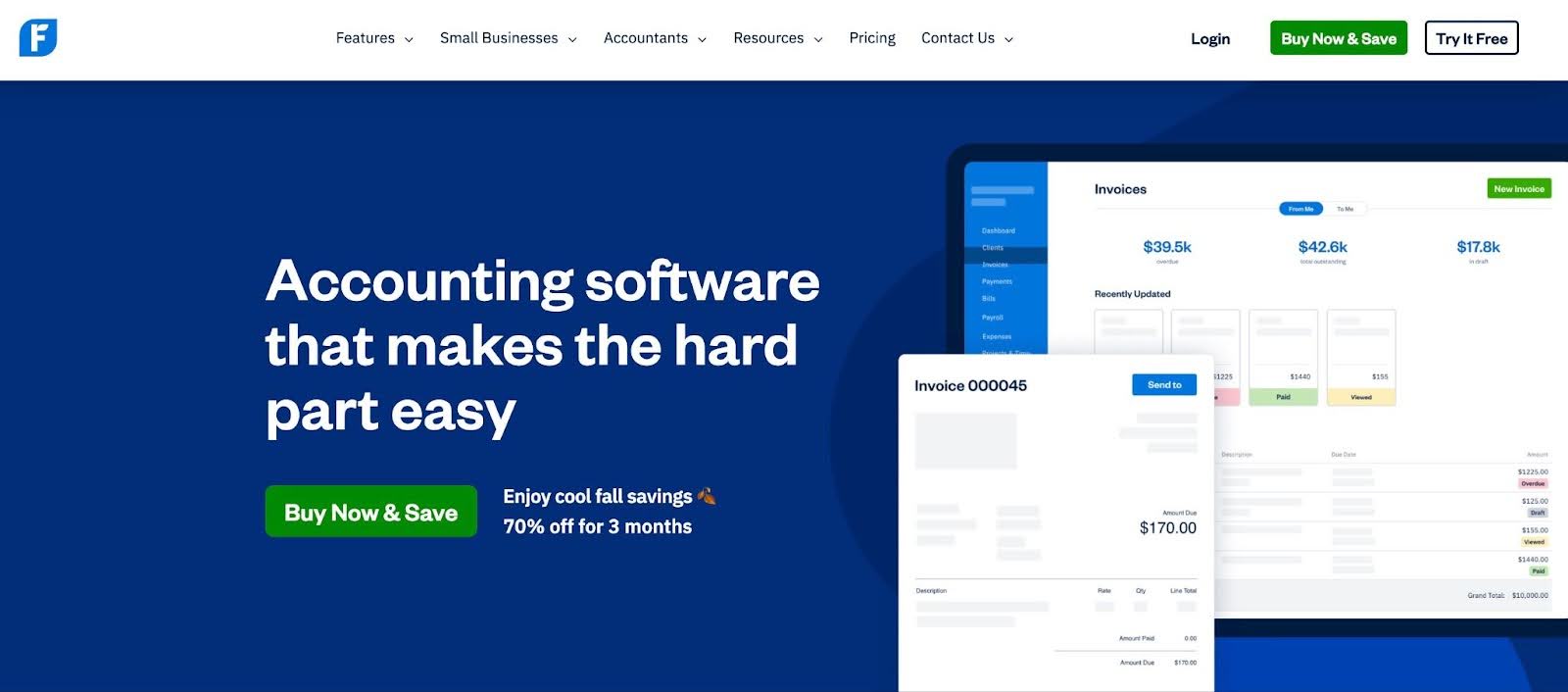
FreshBooks is an accounting software that enables accounting teams to send invoices, track time, manage receipts, expenses, and accept payments.
It is primarily built for firms that serve service-based businesses and solopreneurs.
Here are some of FreshBooks’ features and their benefits:
- Time Tracking: Built-in time logs that improve billing accuracy.
- Expense Management: Imports and categorizes expenses to reduce manual work.
- Project Management: Intuitive task management and file storage that improve accounting results.
- Collaboration: Allows accountants to share files and information remotely.
- Customizable Invoicing: Easily create, customize, and send invoices to get paid on time.
- Automated Reminders: Notify clients to send outstanding payments for late payments.
- Payment Integrations: Accepts payments from providers like Stripe and PayPal.
4. Wave Accoutning
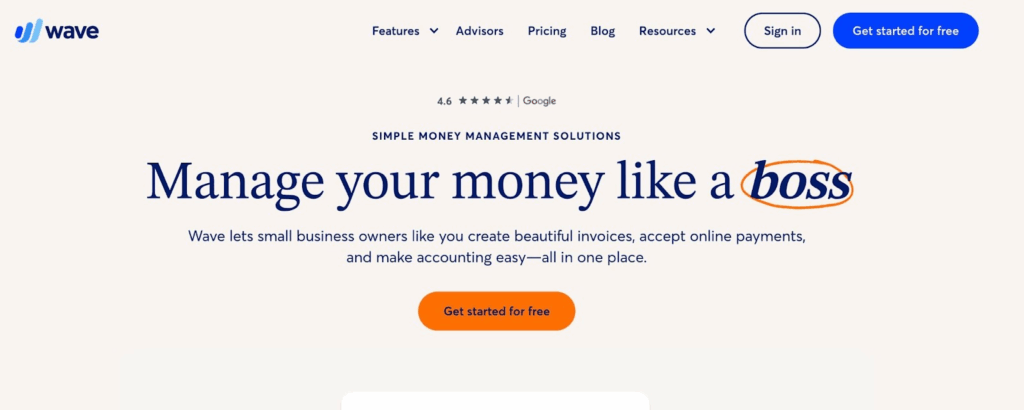
Wave’s basic functionality enables firms to deliver accounting services to micro-businesses. Its free plan makes it particularly ideal for firms looking to cut costs.
Here are some of Wave’s features and their benefits:
- Dashboard: Wave’s dashboard requires very little accounting experience to navigate.
- Invoicing: Customizable invoices that simplify client billing.
- Bank Reconciliation: Automatically imports and categorizes financial data to reduce manual tasks.
- Basic Reporting: Provides simple reports that micro businesses need to make decisions.
- Payroll: Allows you to pay independent contractors and employees, and generate W-2 and 1099 forms for tax purposes.
5. Zoho Books
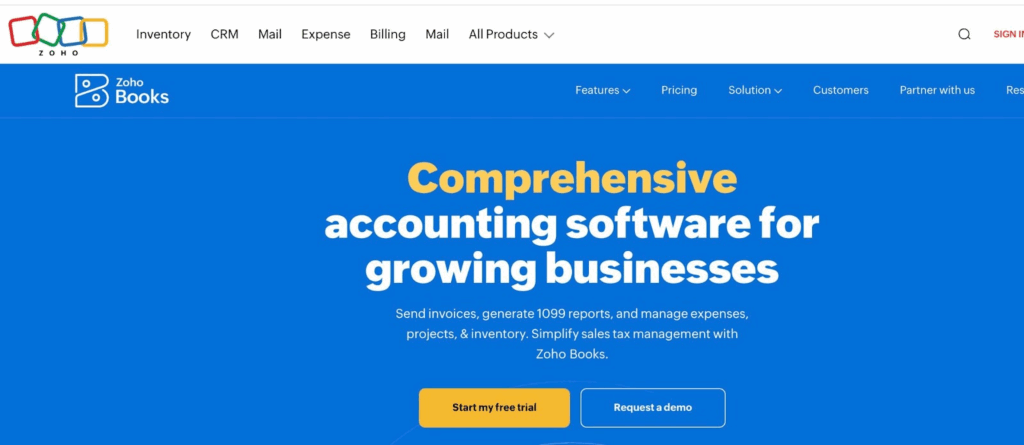
Zoho Books enables firms to record clients’ financial activities (sales and purchases) and collect payments in one place.
It is best suited for firms serving businesses within the larger Zoho suite of apps.
Here are some of Zoho Books’ features and their benefits:
- Automation: Invoices and approvals can be automated to reduce manual efforts.
- Tax Compliance Tools: Make tax filing easier by allowing users to set up tax rules based on their country’s regulations.
- Multi-currency Support: Zoho allows businesses to receive payments in over 160 currencies in the world.
- Integration with Zoho Suite: Connects with other Zoho software solutions, CRM, inventory, and HR apps.
- Customizable Reports: Several options to tailor financial dashboards and reports to your clients’ needs.
Side-by-Side Comparison of Cloud Accounting Tools
| Criteria | QuickBooks Online | Xero | FreshBooks | Wave Accounting | Zoho Books |
|---|---|---|---|---|---|
| Pricing Tiers & Subscription Models |
Simple Start: $19/month for 1 user Essentials: $37/month for 3 users Plus: $57.50/month for 5 users Advanced: $137.50/month (25 users) |
Starter: $29/month per user Standard: $46/month per user Premium: $69/month per user |
Lite: $6.30/month Plus: $11.40/month Premium: $19/month Select: Custom pricing |
Starter Plan: Free Pro: $190/year |
Free Plan: Standard: $15/month for 3 users Professional: $40/month for 5 users Premium: $60/month for 10 users |
| Mobile App Capabilities |
iOS/Android app: Create & send invoices Accept payments Track expenses View reports |
iOS/Android app: Create & send invoices Track expenses Bank reconciliation Real-time updates |
iOS/Android app: Create & send invoices Accept payments Track time & expenses Basic reports |
iOS/Android app: Create invoices Accept payments Track expenses Basic overview |
iOS/Android app: Create invoices Accept payments Track time & expenses View reports, multi-currency |
| Client Portal & Collaboration Features |
Accountant Portal: Real-time access Invoices & reports sharing Multi-user support |
Unlimited Users: Team & client collaboration Reports & invoice sharing Role-based access control |
Client Portal: Clients can view & pay invoices Approve estimates Invite accountants with comments |
Basic Portal: Clients can view & pay invoices Invite accountants Unlimited users for basic access |
Client Portal: Clients can view transactions, approve estimates & pay invoices Multi-user support Role-based access Zoho CRM collaboration |
| Reporting & Analytics Tools |
Real-time reports & dashboards AI-driven cash flow forecasting Advanced analytics (higher plans) |
Customizable reports Real-time dashboards Project profitability tracking |
Basic reports Customizable dashboards Time tracking reports |
Basic reports Limited analytics |
Customizable reports Real-time dashboards Multi-currency reporting Zoho Analytics integration |
| Customer Support & Training Resources |
Support: 24/7 phone, live chat, email Training: Help center, video tutorials, webinars |
Support: Email, live chat Training: Help center, video guides, Xero Central, advisor directory |
Support: Phone, email, live chat Training: Help center, webinars, tutorials, dedicated support (higher plans) |
Support: Email, live chat, limited phone Training: Help center, basic tutorials |
Support: Phone, email, live chat Training: Help center, tutorials, webinars, dedicated support |
How to Choose the Best Software for Your Firm’s Unique Needs
The reason two firms can choose two separate tools and both turn out to be the right decision is that they focus on their unique needs and long-term goals.
Here’s how you can choose a tool that suits their specific needs:
Consider your firm’s size and client base
Firms struggle with maximizing their accounting software when they choose a tool that is either too basic or elaborate for their clients and teams (which will frustrate collaboration or overwhelm the team and clients, leading to churn.
That is why Wave can be a better solution for firms looking for simplicity and affordability than QBO. But if scalability is important to the firm, then QBO will be a better choice because it offers better multi-user support.
Secondly, if the majority of your clients already use a tool, it makes more sense to choose the tool as well because it would be easier for them to use it instead of learning another one from scratch.
Moreover, some industries are more tech-savvy than others. If your clients are in low-tech industries, like construction, you should choose a tool they can easily use to encourage effective client collaboration.
Evaluate integration with existing workflows
Small firms don’t have the resources to dedicate someone to IT, and that’s all the more reason you can’t afford a software solution that works in isolation from the other tools in your tech stack.
An accounting software that integrates with your project management, bank feeds, and client relationship management (CRM, etc. will automatically transfer relevant data between these tools to minimize manual data entry that wastes time and increases errors.
Budget considerations and ROI
When thinking about budget, low-cost platforms may seem more attractive than those with higher up-front payment, but consider the trade-off carefully.
Low cost might mean an inability to manage complex client needs, like extensive integrations (as is often the case with E-Commerce clients). These tools are also less scalable, which will prevent many firms from adding more clients, team members, and upgrading their payment plan.
As you finalize your budget, consider onboarding time and automation capabilities to be sure your accounting software won’t cause bottlenecks as your team and client needs evolve.
Case Study: How Finsmart’s Client, Account Ability Consulting, Benefited from Cloud Accounting Integration
Account Ability Consulting is a small accounting firm in the U.S. that specializes in QuickBooks training and integrations.
When they faced the challenge of managing a client’s account that required reconciliation, correction, and reporting of three years’ worth of financial data, they relied on QuickBooks Online and their offshore partner to properly record their financial data and generate accurate reports that meet compliance requirements and support business growth.
Solution
Finsmart assigned a team of GAAP-qualified and QBO-proficient accountants to work directly with the Account Ability team.
This embedded model enabled Susan Cook to add the Finsmart team to relevant apps for easy onboarding, collaboration, and performance tracking, ensuring that the firm’s procedures and best practices were followed.
Outcome
Thanks to QuickBooks integration and the use of Finsmart Outsourcing services (which gave Susan sufficient capacity to handle the project), the client received clear, structured, and reliable financial data that has enabled them to maintain compliance since then.
Without QuickBooks’ ability to centralize financial data in the cloud and encourage collaboration, the Account Ability team wouldn’t have been able to delegate the project to the outsourcing team.
“The Finsmart Accounting team was excellent at communicating and ensuring the work was done thoroughly. They provided spreadsheets, followed up diligently, and worked efficiently. If you have a financial project that needs attention, just try it. You’ll find they are accommodating and reliable. You can feel confident that you’re in good hands.”
Susan Cook, President of Account Ability Consulting
Read more about Account Ability’s journey to helping their client put their three-year financial data in order here.
Set Your Firm Up for the Future of Accounting Work with the Right Cloud Accounting Software
Manual accounting systems give new accounting firm owners the option of managing client finances with makeshift tools, which are usually a combination of spreadsheets, desktop accounting systems, and pen-and-paper bookkeeping.
But it becomes hard for them to understand that what gets a firm to 10 clients and two team members will not be enough to take them to 50 clients and seven team members.
To collaborate with clients in real-time, hire and work with quality accountants (who may not be in your city or country), and automate routine tasks like bank feeds, cloud accounting software is critically important.
Meanwhile, accounting software (the right one, if you may) will centralize your client’s information in the cloud, which will give your team members remote access to financial information to deliver client services at any time.
This keeps your team on top of your client’s data and enables them to apply their accounting expertise to their financial situation without the distractions of manual workarounds.
This enables you to deliver excellent client services as your firm and team grow and financial regulations evolve.
If you want to partner with an outsourced accounting team with the expertise to help you choose and implement a suitable accounting software solution, click here to book a free consultation.
In this Article
CONTENT DISCLAIMER
The content in this article is for general information and education purposes only and should not be construed as legal or tax advice. Finsmart Accounting does not warrant or guarantee the accuracy, completeness, adequacy, or currency of the information in the article. You should seek the advice of a competent lawyer or accountant licensed to practise in your jurisdiction for advice on your particular situation.
FINSMART SERVICES

